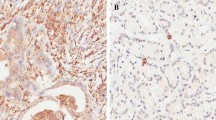Abstract
The Hippo signaling pathway is a critical regulator of organ size control during development, and its deregulation is associated with cancers. Acting downstream of this pathway, Yes-associated protein (YAP) was implicated in tumorigenesis. The present study aimed to explore the expression patterns and clinical significance of YAP in human colorectal cancer (CRC). In addition, we investigated the relationship between YAP expression and Wnt/β-catenin pathway activation in CRC. A total of 139 cases of CRC tissues were investigated by immunohistochemistry for the expression of YAP, cyclin D1, and β-catenin. The association between YAP expression and clinicopathologic features was analyzed. Our results showed that YAP was overexpressed in 52.5 % (73/139) cases of CRC and predominantly presented in the nucleus. There was an excellent correlation between YAP expression and pTNM stage (p = 0.0024). YAP expression in CRC was significantly correlated with nodal status (p = 0.0034), tumor status (p = 0.0382), and cyclin D1 overexpression (p < 0.0001). Importantly, YAP expression was associated with short overall survival (p < 0.001). Furthermore, patients with YAP-positive and nuclear β-catenin-positive profiles had worse overall survival. Univariate and multivariate analyses revealed that YAP expression was an independent prognostic indicator of CRC (p = 0.0207). Our results indicated that YAP overexpression contributed to the tumorigenesis and played a pivotal role in the progression in CRC, and the interaction of YAP and Wnt/β-catenin pathways needs further exploration.



Similar content being viewed by others
References
Zhao B et al. The Hippo-YAP pathway in organ size control and tumorigenesis: an updated version. Genes Dev. 2010;24(9):862–74.
Dong J et al. Elucidation of a universal size-control mechanism in Drosophila and mammals. Cell. 2007;130(6):1120–33.
Hanahan D, Weinberg RA. The hallmarks of cancer. Cell. 2000;100(1):57–70.
Huang J et al. The Hippo signaling pathway coordinately regulates cell proliferation and apoptosis by inactivating Yorkie, the Drosophila homolog of YAP. Cell. 2005;122(3):421–34.
Wu S et al. Hippo encodes a Ste-20 family protein kinase that restricts cell proliferation and promotes apoptosis in conjunction with salvador and warts. Cell. 2003;114(4):445–56.
Edgar BA. From cell structure to transcription: Hippo forges a new path. Cell. 2006;124(2):267–73.
Pan D. Hippo signaling in organ size control. Genes Dev. 2007;21(8):886–97.
Zhao B et al. Inactivation of YAP oncoprotein by the Hippo pathway is involved in cell contact inhibition and tissue growth control. Genes Dev. 2007;21(21):2747–61.
Overholtzer M et al. Transforming properties of YAP, a candidate oncogene on the chromosome 11q22 amplicon. Proc Natl Acad Sci U S A. 2006;103(33):12405–10.
Zender L et al. Identification and validation of oncogenes in liver cancer using an integrative oncogenomic approach. Cell. 2006;125(7):1253–67.
Espanel X, Sudol M. Yes-associated protein and p53-binding protein-2 interact through their WW and SH3 domains. J Biol Chem. 2001;276(17):14514–23.
Howell M, Borchers C, Milgram SL. Heterogeneous nuclear ribonuclear protein U associates with YAP and regulates its co-activation of Bax transcription. J Biol Chem. 2004;279(25):26300–6.
Komuro A et al. WW domain-containing protein YAP associates with ErbB-4 and acts as a co-transcriptional activator for the carboxyl-terminal fragment of ErbB-4 that translocates to the nucleus. J Biol Chem. 2003;278(35):33334–41.
Strano S et al. The transcriptional coactivator Yes-associated protein drives p73 gene-target specificity in response to DNA damage. Mol Cell. 2005;18(4):447–59.
Strano S et al. Physical interaction with Yes-associated protein enhances p73 transcriptional activity. J Biol Chem. 2001;276(18):15164–73.
Yagi R et al. A WW domain-containing yes-associated protein (YAP) is a novel transcriptional co-activator. EMBO J. 1999;18(9):2551–62.
Zaidi SK et al. Tyrosine phosphorylation controls Runx2-mediated subnuclear targeting of YAP to repress transcription. EMBO J. 2004;23(4):790–9.
Zhao B et al. TEAD mediates YAP-dependent gene induction and growth control. Genes Dev. 2008;22(14):1962–71.
Baldwin C et al. Multiple microalterations detected at high frequency in oral cancer. Cancer Res. 2005;65(17):7561–7.
Fernandez LA et al. YAP1 is amplified and up-regulated in hedgehog-associated medulloblastomas and mediates Sonic hedgehog-driven neural precursor proliferation. Genes Dev. 2009;23(23):2729–41.
Modena P et al. Identification of tumor-specific molecular signatures in intracranial ependymoma and association with clinical characteristics. J Clin Oncol. 2006;24(33):5223–33.
Snijders AM et al. Rare amplicons implicate frequent deregulation of cell fate specification pathways in oral squamous cell carcinoma. Oncogene. 2005;24(26):4232–42.
Steinhardt AA et al. Expression of Yes-associated protein in common solid tumors. Hum Pathol. 2008;39(11):1582–9.
Wang Y et al. Overexpression of yes-associated protein contributes to progression and poor prognosis of non-small-cell lung cancer. Cancer Sci. 2010;101(5):1279–85.
Xu MZ et al. Yes-associated protein is an independent prognostic marker in hepatocellular carcinoma. Cancer. 2009;115(19):4576–85.
Camargo FD et al. YAP1 increases organ size and expands undifferentiated progenitor cells. Curr Biol. 2007;17(23):2054–60.
Jemal A, et al. Cancer statistics. CA Cancer J Clin.2010.
Klaus A, Birchmeier W. Wnt signalling and its impact on development and cancer. Nat Rev Cancer. 2008;8(5):387–98.
Avruch J, Zhou D, Bardeesy N. YAP oncogene overexpression supercharges colon cancer proliferation. Cell Cycle. 2012;11(6):1090–6.
Zhou D et al. Mst1 and Mst2 protein kinases restrain intestinal stem cell proliferation and colonic tumorigenesis by inhibition of Yes-associated protein (Yap) overabundance. Proc Natl Acad Sci U S A. 2011;108(49):E1312–20.
Konsavage Jr WM et al. Wnt/beta-catenin signaling regulates Yes-associated protein (YAP) gene expression in colorectal carcinoma cells. J Biol Chem. 2012;287(15):11730–9.
Ogino S et al. A cohort study of cyclin D1 expression and prognosis in 602 colon cancer cases. Clin Cancer Res. 2009;15(13):4431–8.
Cao X, Pfaff SL, Gage FH. YAP regulates neural progenitor cell number via the TEA domain transcription factor. Genes Dev. 2008;22(23):3320–34.
Clevers H. Wnt/beta-catenin signaling in development and disease. Cell. 2006;127(3):469–80.
Conflicts of interest
No conflict of interest was disclosed in this article.
Author information
Authors and Affiliations
Corresponding author
Rights and permissions
About this article
Cite this article
Wang, Y., Xie, C., Li, Q. et al. Clinical and prognostic significance of Yes-associated protein in colorectal cancer. Tumor Biol. 34, 2169–2174 (2013). https://doi.org/10.1007/s13277-013-0751-x
Received:
Accepted:
Published:
Issue Date:
DOI: https://doi.org/10.1007/s13277-013-0751-x




